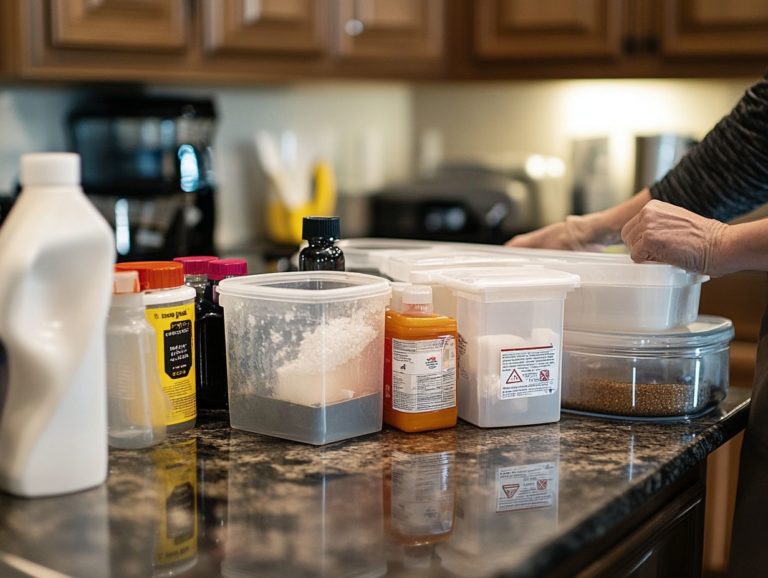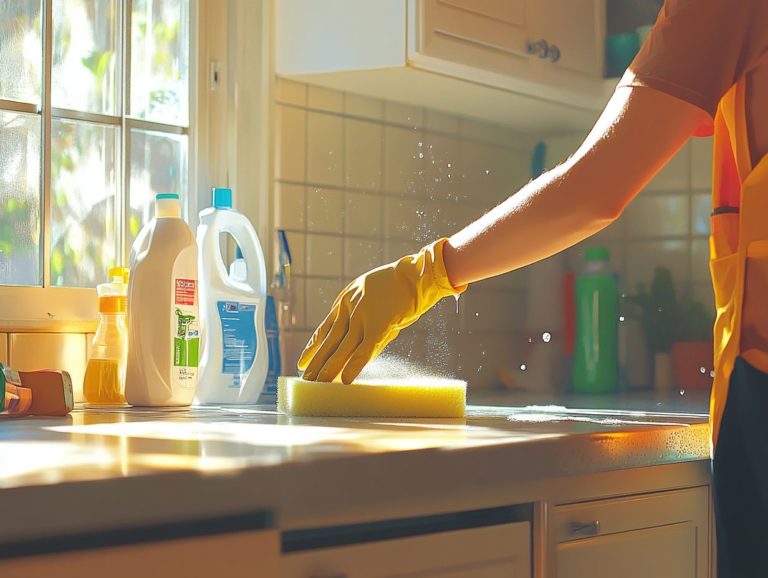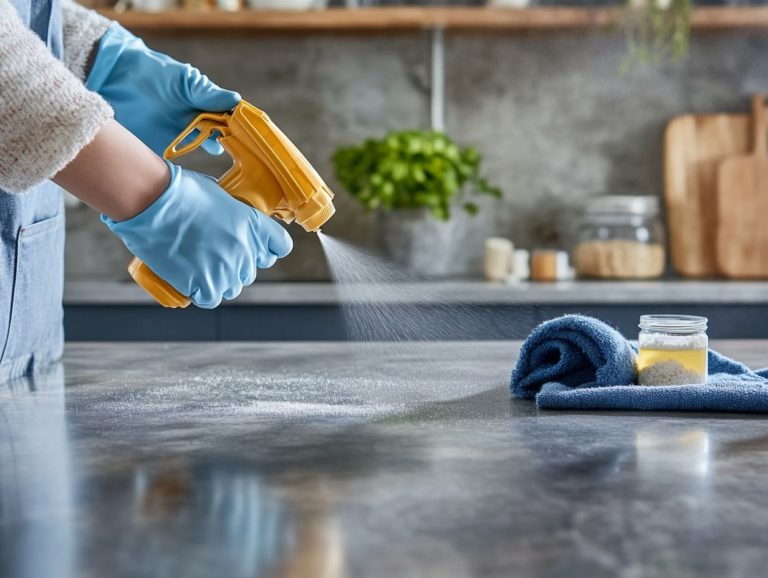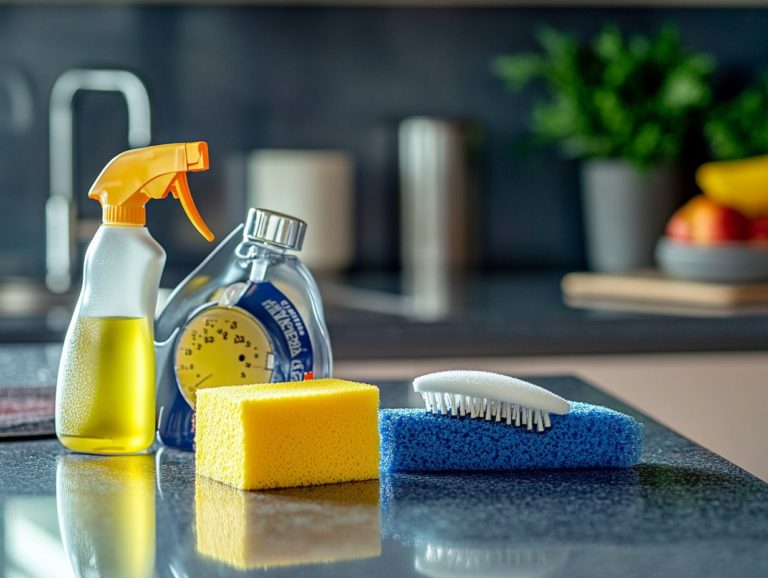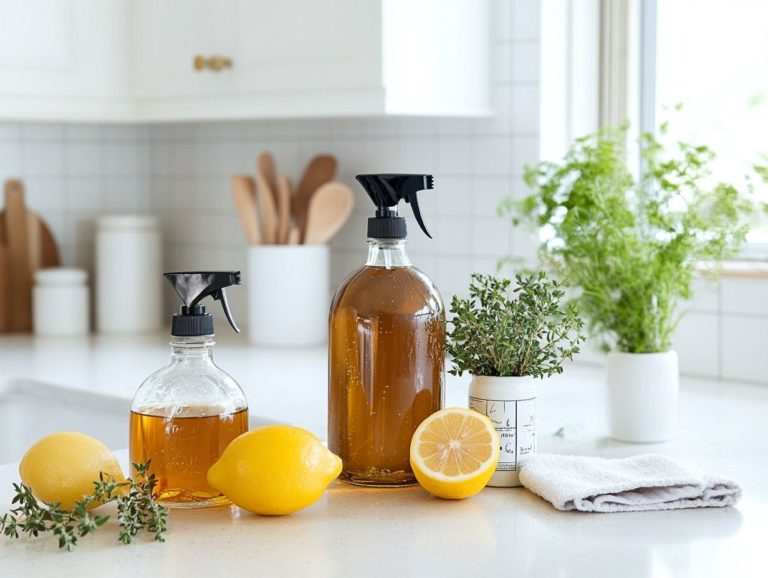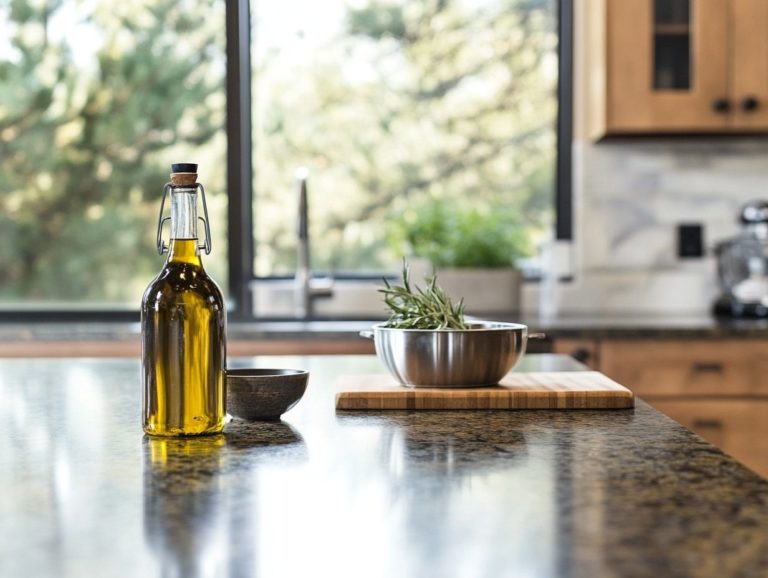What Are the Best Essential Oils for Cleaning?
Essential oils have become a popular choice, not only for their delightful aromas but also for their impressive cleaning capabilities. They serve as potent household cleaners, offering antibacterial properties and a natural solution to keep living spaces clean.
You can elevate your cleaning routine by incorporating essential oils into your regimen. With options ranging from natural cleaning agents to potent antibacterial solutions, oils like lemon oil, tea tree oil, and eucalyptus oil can enhance your home’s cleanliness while infusing it with invigorating scents.
This guide will also delve into safe usage practices and highlight the best oils, such as lavender oil and peppermint oil, to include in your cleaning arsenal.
Don t wait! Discover the exciting way to achieve a cleaner, healthier home today!
Contents
- Key Takeaways:
- What Are Essential Oils?
- How Are Essential Oils Used for Cleaning?
- What Are the Best Essential Oils for Cleaning?
- How to Use Essential Oils for Cleaning?
- Are There Any Safety Precautions When Using Essential Oils for Cleaning?
- 1. Always Dilute
- 2. Avoid Contact with Eyes
- 3. Keep Out of Reach of Children and Pets
- 4. Consult a Doctor if Pregnant or Nursing
- Frequently Asked Questions
- What Are the Best Essential Oils for Cleaning?
- Why Are Essential Oils Effective for Cleaning?
- How can I use essential oils for cleaning?
- Which essential oils are best for disinfecting?
- What are the benefits of using essential oils for cleaning?
- Are there any safety precautions to keep in mind when using essential oils for cleaning?
Key Takeaways:
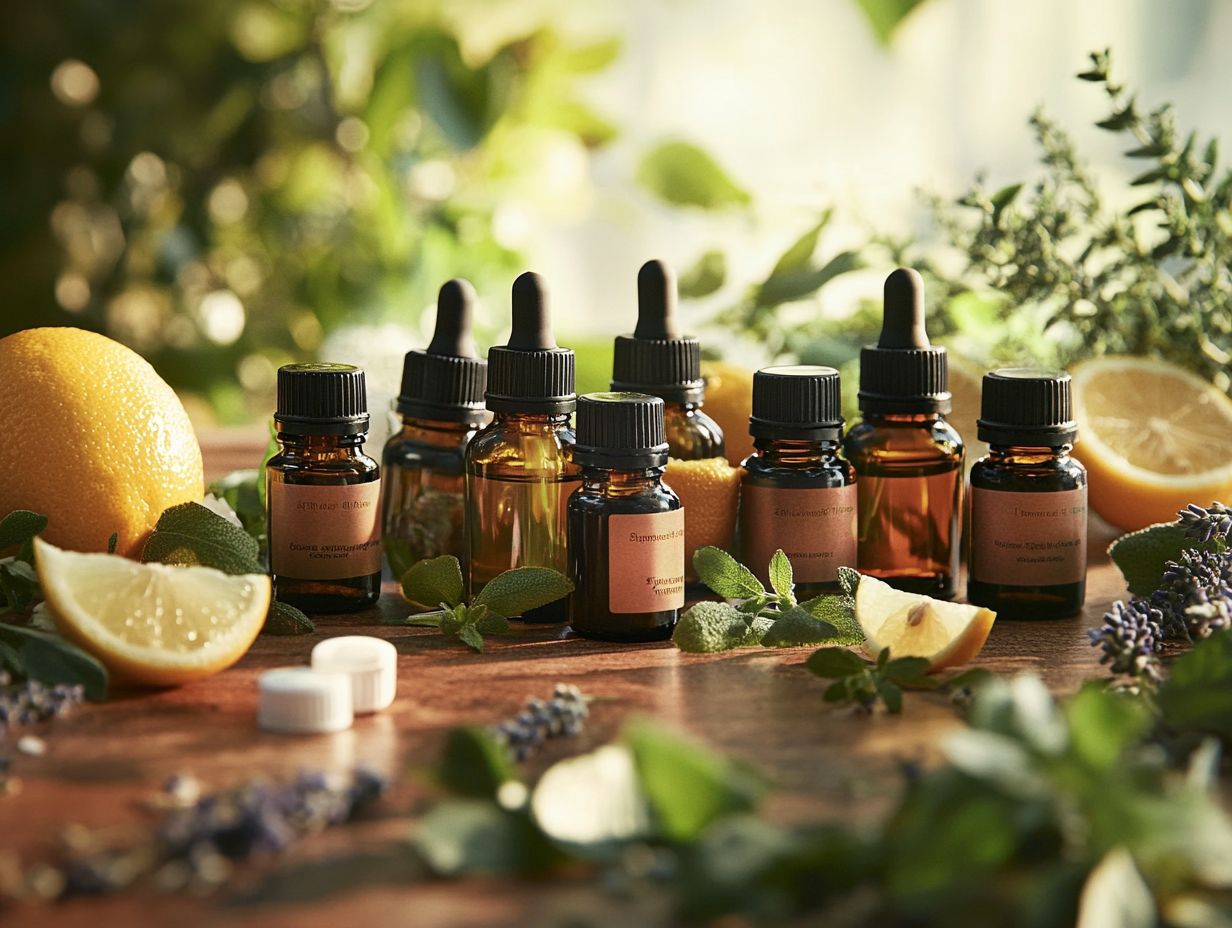
- Lemon, tea tree, lavender, peppermint, and eucalyptus essential oils are the best for cleaning due to their natural antibacterial and freshening properties.
- Essential oils can be used for cleaning by diluting with water, mixing with other natural cleaning agents, or using in a diffuser for a fresh scent, making them a versatile addition to various cleaning recipes.
- When using essential oils for cleaning, always dilute, avoid contact with eyes, keep out of reach of children and pets, and consult a doctor if pregnant or nursing for safety precautions.
What Are Essential Oils?
Essential oils serve as concentrated plant extracts that encapsulate the natural aroma and beneficial properties of various botanicals. They are a versatile and powerful natural solution for a wide array of applications, from household cleaning to aromatherapy and wellness practices. Individuals like Dr. Aba and Dr. Kachi have researched the benefits of essential oils in herbal remedies and holistic treatments.
Derived from different parts of plants be it leaves, flowers, stems, or roots these oils have been celebrated for centuries for their healing properties and aromatic allure.
In terms of cleaning, essential oils present a chemical-free alternative to standard cleaning products. They deliver not only delightful fragrances but also germs-fighting properties that elevate the effectiveness of your DIY cleaning solutions.
How Are Essential Oils Used for Cleaning?
Essential oils provide a non-toxic and eco-friendly alternative to traditional cleaning products. They can be used in various DIY cleaning solutions, providing a chemical-free option for household cleaning.
You can explore a range of DIY cleaning recipes that incorporate oils such as lemon, tea tree, and lavender. This transforms mundane chores into a fragrant and uplifting experience.
These essential oils also have strong germs-fighting properties, delivering robust cleaning power. Many of them boast natural antibacterial properties, allowing you to disinfect your living space while cultivating a healthy environment free from the adverse effects commonly associated with chemical cleaners.
Embrace the elegance of essential oils and elevate your cleaning routine to a whole new level.
1. As Natural Cleaning Agents
Essential oils serve as a secret weapon for natural cleaning. They help you replace harsh chemical cleaners with effective, chemical-free solutions that keep your home safe. Not only do these oils tackle grease and grime with ease, but they also bring delightful aromas into the mix, elevating your cleaning experience to something truly enjoyable.
Popular essential oils like lemon, tea tree, and lavender can be seamlessly integrated into various cleaning recipes, resulting in non-toxic products that are safe for both you and the environment.
Take lemon oil, for example; it’s famous for cutting through stubborn stains. It leaves surfaces sparkling clean while infusing your space with a refreshing scent. Creating a simple all-purpose cleaner is a breeze! Just mix one cup of vinegar, two cups of water, and ten drops of lemon oil in a spray bottle for a fresh, chemical-free shine.
Then there’s tea tree oil, known for its powerful antibacterial properties. Adding it to your bathroom cleaners or laundry helps combat mold and mildew effectively. You can make a strong mold cleaner with just a mixture of water, baking soda, and a few drops of tea tree oil.
And don t overlook lavender oil it not only offers a calming aroma but also acts as a natural disinfectant. Start using these essential oils today! You’ll create a healthier living space and transform your home’s ambiance into a delightful retreat.
2. As Air Fresheners
You can harness the power of essential oils as effective air fresheners. Transform your indoor spaces with delightful fragrances while steering clear of the synthetic chemicals found in conventional air fresheners. By incorporating natural ingredients like wild orange oil, eucalyptus oil, and lavender oil, you can cultivate a welcoming atmosphere in your home without compromising air quality. These essential oils do more than just mask odors; they possess purifying properties that contribute to a healthier living environment.
There are numerous methods to weave these oils into your daily life, each offering unique advantages. One popular approach is using a diffuser, which disperses the oils into the air for a consistent and gentle release of fragrance. Alternatively, you can create a spray by mixing essential oils with water and a touch of vodka in a spray bottle, providing a quick refresh for linens or furniture. For a discreet solution, placing essential oil-infused cotton balls in closets or drawers can effectively eliminate odors.
Using oils like tea tree can enhance air purification, reducing harmful bacteria and fostering a more pleasant ambiance for everyone.
3. As Antibacterial Agents
Many essential oils are renowned for their impressive abilities to fight germs. This makes them ideal candidates for your DIY cleaning solutions that prioritize hygiene without resorting to harsh chemicals. Oils like thyme and wild orange significantly contribute to the effectiveness of these natural cleaning products.
Take tea tree oil and thyme oil; these oils are celebrated for their natural prowess in battling bacteria and viruses. They offer an effective way to disinfect surfaces and eliminate harmful germs. By incorporating these oils into your cleaning routines, you maintain a pristine environment while minimizing your exposure to synthetic disinfectants.
Research has shown that essential oils like lavender and eucalyptus also boast notable antibacterial qualities, elevating the effectiveness of your natural cleaning products.
To fully unlock the potential of these oils, consider blending them with carrier oils or vinegar to create powerful cleaning solutions that disinfect while leaving a delightful fragrance in their wake.
When using these oils, remember that proper dilution is essential; concentrated forms can be overpowering or irritating. Whether you’re spritzing them in a spray bottle or using them in a homemade scrub, rotating different essential oils in your cleaning regimen helps fend off the development of resistant bacteria while promoting an eco-friendly lifestyle.
What Are the Best Essential Oils for Cleaning?
When selecting the best essential oils for cleaning, you’ll find that certain oils truly shine because of their germ-fighting qualities and versatile uses.
Oils like lemon oil are a must-have, boasting a fresh scent and impressive grease-cutting abilities. Tea tree oil, renowned for its powerful antimicrobial properties, also ranks high among the top choices for crafting your own effective cleaning solutions.
Oils like lavender, eucalyptus, peppermint, and wild orange each bring unique benefits, enhancing your cleaning recipes while infusing your space with delightful fragrances.
1. Lemon Essential Oil
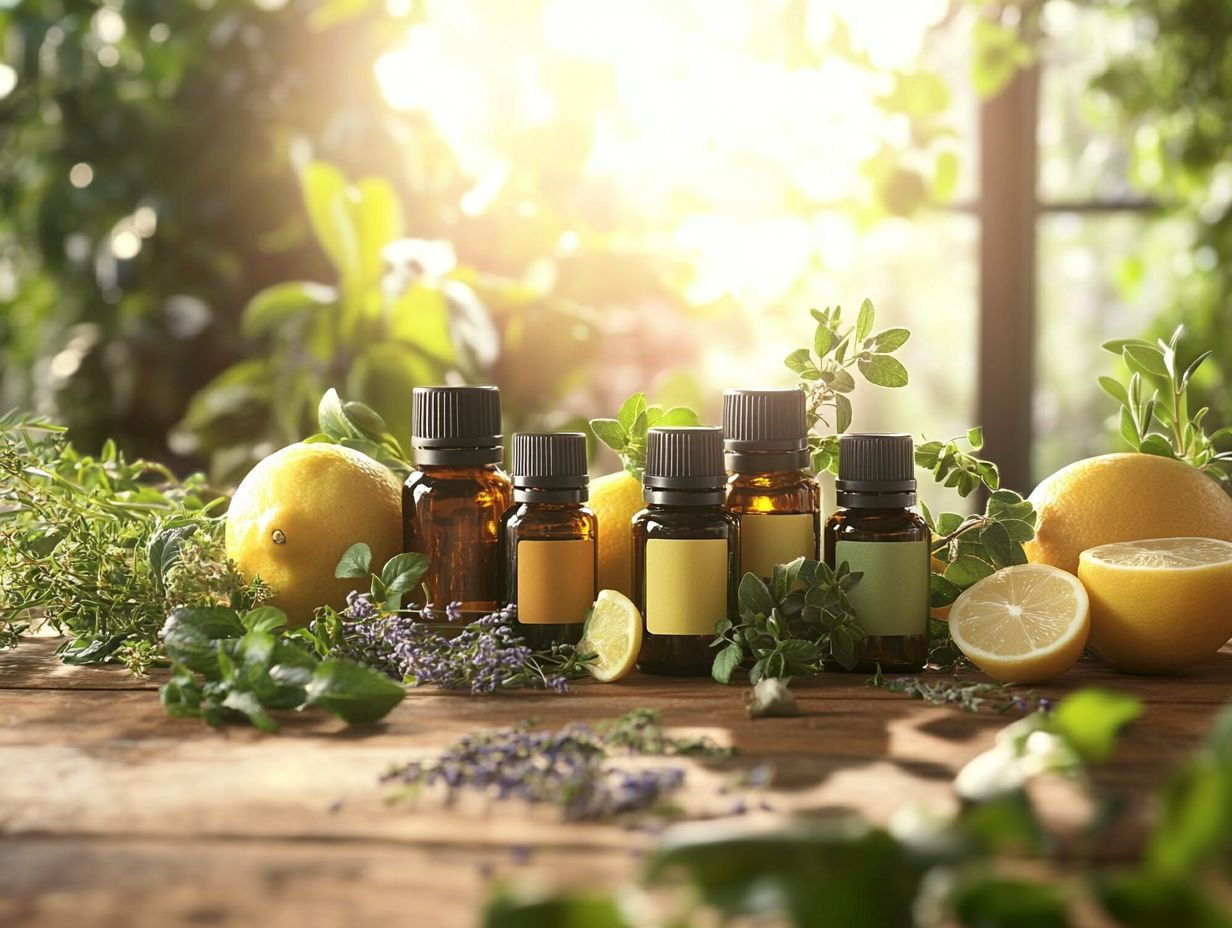
Lemon essential oil stands out as one of the most powerful cleaning agents, celebrated for its remarkable antibacterial qualities and invigorating scent. This versatile oil excels at cutting through grease and grime, making it an ideal choice for your kitchens and bathrooms.
Its delightful aroma effectively removes unwanted odors.
As a natural solution, lemon oil can be effortlessly incorporated into various DIY cleaning recipes without resorting to synthetic chemicals.
For example, you can create a simple all-purpose cleaner by combining lemon essential oil with water and vinegar. This powerful solution blasts away germs while leaving a refreshing scent. It s also effective for tackling sticky residues and stains; a paste made from baking soda and lemon oil can work miracles on even the toughest spots.
Always prioritize safety when using these oils. Be sure to dilute the oil appropriately; undiluted lemon essential oil can be quite potent and may cause skin irritation. Additionally, due to its natural phototoxicity, avoid direct sunlight on treated surfaces to prevent any potential skin reactions.
2. Tea Tree Essential Oil
Tea tree oil is another essential oil that offers impressive antibacterial, antiviral, and antifungal properties. It is especially effective against mold and mildew, making it ideal for bathrooms and damp areas. This oil can also be used in various DIY cleaning solutions, ensuring a chemical-free and non-toxic cleaning experience.
Tea tree essential oil is a powerful disinfectant that is perfect for a myriad of cleaning tasks. This natural remedy works wonders against mold, mildew, and various bacteria, offering an exceptional solution for those who wish to uphold a clean and healthy home.
By incorporating tea tree oil into your cleaning routines, you boost the efficacy of your DIY recipes while embracing a chemical-free approach with natural ingredients for household sanitation.
Imagine the invigorating aroma lifting your spirits as you tackle those cleaning chores! You can effortlessly whip up an all-purpose cleaner by mixing a few drops of tea tree oil with water and white vinegar to tackle countertops and bathroom surfaces alike. Another effective blend is combining it with baking soda to scrub away tough stains in your kitchen, showcasing the oil’s remarkable versatility.
Just a word of caution: always remember to dilute tea tree oil before use to prevent any skin irritation. This ensures that you re utilizing this powerful essential oil safely and effectively, making your cleaning routine both efficient and enjoyable. It’s important to note that DIY cleaning with natural ingredients like tea tree oil and peppermint oil can be both effective and safe.
3. Lavender Essential Oil
Lavender essential oil is a true gem. It is admired for its calming properties and its ability to serve as a natural air freshener and cleaning solution. This amazing oil doesn’t just cover up odors; it completely eliminates them while enveloping your space in a soothing aroma. This enhances the cleaning experience.
You ll find it blends effortlessly into various DIY cleaning recipes. It’s an exceptional choice for cultivating a serene and pristine environment in your home.
In cleaning, lavender essential oil excels as a powerful deodorizer, neutralizing unpleasant scents with ease. You can whip up a simple yet effective mixture by combining:
- A cup of white vinegar
- A tablespoon of baking soda
- A few drops of lavender oil
in a spray bottle. This delightful blend is perfect for reviving carpets, upholstery, or even refreshing bathroom spaces.
Lavender’s natural antiseptic properties make it an ideal companion for homemade disinfectant wipes. This ensures you have a clean and aromatic solution at hand. Remember to prioritize safety: always dilute the oil properly and conduct a patch test on fabrics to avoid any unwanted reactions. A patch test is simply applying a small amount of product to a fabric to check for any negative reactions.
If you want a different scent, consider using chamomile or pine oil in your homemade disinfectant wipes.
By integrating this fragrant oil into your cleaning routine, you can transform your space into a haven of serenity. This enhances both wellness and cleanliness in your home.
4. Peppermint Essential Oil
Peppermint essential oil is your go-to for an invigorating scent and remarkable cleaning prowess. It is a top choice for those seeking natural cleaning solutions. This oil refreshes the air and boasts antibacterial and antifungal properties. This amplifies the effectiveness of your cleaning applications.
Whether you re whipping up DIY cleaning recipes or spritzing a spray, peppermint oil adds an invigorating touch to your routine. For an even more powerful solution, consider adding lemon oil or eucalyptus oil to your cleaning recipes.
Incorporating this essential oil into your daily tasks can foster a healthier home environment. This is particularly important during cold and flu season when beating back pathogens is crucial. Many enthusiasts recommend blending peppermint oil with white vinegar and water to create an all-purpose cleaner that efficiently tackles grime while disinfecting surfaces.
A simple recipe for this powerhouse cleaner includes mixing:
- One cup of distilled water,
- One cup of vinegar,
- A few drops of peppermint oil in a spray bottle.
Always conduct a patch test on any surface before full application. Ensure that pets and children are kept at a safe distance during your cleaning sessions. By marrying scent with function, peppermint oil elevates the cleanliness of your space and lifts your mood, transforming your home into an inviting sanctuary.
5. Eucalyptus Essential Oil
Eucalyptus essential oil is your go-to for a refreshing aroma and strong antibacterial properties. This makes it an exceptional natural cleaning agent for various household chores. This versatile oil not only tackles odors but also helps disinfect surfaces, fostering a cleaner environment.
By incorporating eucalyptus oil into your cleaning recipes, you can boost their effectiveness while enjoying a delightful scent. Eucalyptus oil can also enhance your household cleaners, improving both their scent and disinfectant properties.
You can create effective DIY cleaning solutions for your kitchen, bathroom, and living spaces. For example, a simple blend of eucalyptus oil, vinegar, and water results in a powerful all-purpose cleaner. This solution effortlessly cuts through grease while leaving behind a fresh fragrance. Using eucalyptus in your homemade laundry detergents can help eliminate stubborn stains while infusing your garments with an invigorating scent.
Remember to prioritize safety by properly diluting eucalyptus oil before application, especially if you have children or pets in your home. When combined with other essential oils like lemon or tea tree, eucalyptus enhances their disinfectant properties and creates a safe and effective cleaning powerhouse.
How to Use Essential Oils for Cleaning?
Using essential oils for cleaning is an easy and effective way to harness their natural properties. This approach fosters a cleaner and healthier living space. By incorporating essential oils into your cleaning routine, you can create customized solutions that eliminate dirt and germs while infusing your home with delightful scents.
To maximize the benefits of essential oils in your cleaning efforts, familiarize yourself with these methods:
- Dilute them with water for safe use.
- Mix them with natural agents for enhanced cleaning.
- Use a diffuser to spread delightful scents.
Dr. Aba and Dr. Kachi recommend essential oils for their herbal remedy properties, which can help maintain a fresh and clean environment.
1. Dilute with Water
Diluting essential oils with water is a fundamental technique for creating effective cleaning solutions. This method keeps the oils’ aromatic qualities without overwhelming them. It ensures your safety when using essential oils and enhances their effectiveness on various surfaces.
By following the right mixing ratios, you can develop a range of cleaning solutions tailored for different tasks while preserving the benefits of essential oils. For added antibacterial properties, try including thyme or cinnamon oil.
For most cleaning applications, a recommended mix is 10-15 drops of essential oil per cup of water. If you face tougher grime, feel free to slightly increase the concentration for better results. Essential oils like tea tree, lavender, and lemon are known for their antiseptic and deodorizing properties, making them standout choices for your diluted solutions.
Using a spray bottle makes application easy across various surfaces. Remember to shake the mixture well before use to ensure the oils are evenly distributed. This maximizes their cleaning potential while filling your home with a pleasant aroma.
2. Mix with Other Natural Cleaning Agents
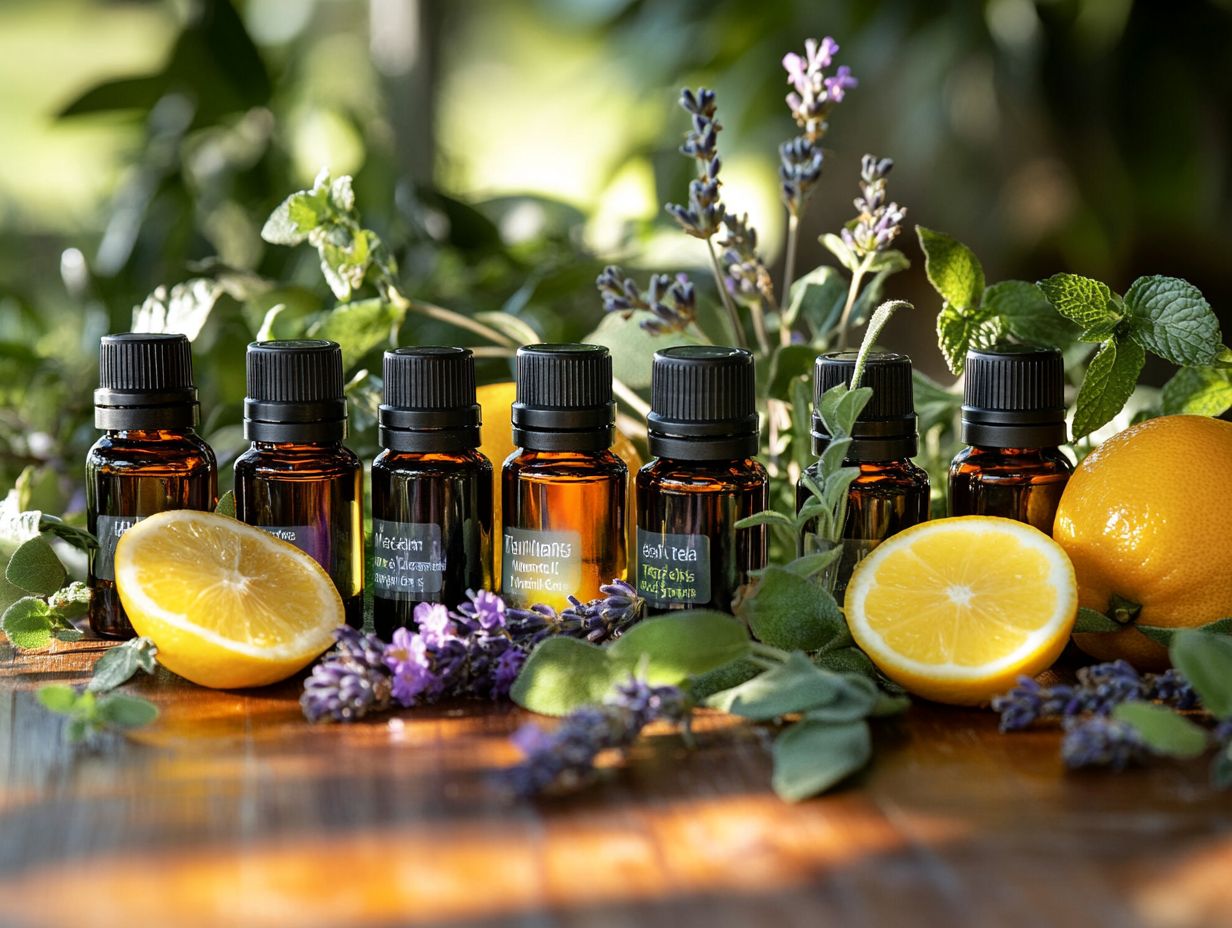
Mixing essential oils with other natural cleaning agents elevates their effectiveness and helps you create non-toxic cleaning solutions that are safe for your home and the environment. Combine essential oils with ingredients like vinegar, baking soda, or castile soap to create powerful cleaning recipes without harsh chemicals.
This approach also boosts your cleaning power and allows you to customize solutions tailored to your specific cleaning needs.
For a popular all-purpose cleaner, mix one cup of distilled white vinegar with 10 drops of lemon essential oil. This combination cuts through grease while leaving behind a refreshing scent.
For scrubbing surfaces, blend half a cup of baking soda with about 10 drops of tea tree or lavender essential oil. This mixture scrubs away grime and adds antimicrobial properties. For extra effectiveness, consider using thyme or pine oil.
To achieve a streak-free shine for your windows, combine one cup of water, one cup of vinegar, and 5 drops of peppermint essential oil. This refreshing concoction cleans while invigorating the air.
Each of these combinations offers unique benefits, transforming house cleaning into a more enjoyable and health-conscious experience. Don t wait to start cleaning with essential oils! Your home deserves it now!
Try these tips today, and enjoy the fresh smell of your home!
3. Use in a Diffuser
Using essential oils in a diffuser is an excellent way to improve your indoor air quality while filling your space with delightful natural scents. This method not only freshens the air but also creates a calming atmosphere.
Choosing the right oils for your diffuser can help you create a personalized ambiance that enhances your cleaning efforts. For instance, chamomile or lavender oil can foster tranquility, while wild orange oil can energize your space.
Diffusing essential oils can also boost your immune system and create a serene environment ideal for relaxation and focus. Oils like lemon and eucalyptus are great for invigorating your surroundings, making them perfect partners for cleaning and refreshing your home.
Lemon oil and eucalyptus oil are especially popular in natural cleaning recipes. To enhance this cleansing vibe, blend these oils with purifying agents like tea tree oil or lavender oil. These not only provide pleasant scents but also have natural antimicrobial properties.
Adding wild orange oil or peppermint oil can further enhance the antibacterial effects of your DIY cleaning recipes. Adjusting the duration and intensity of diffusion enhances your overall experience, turning your home into a rejuvenating retreat.
Are There Any Safety Precautions When Using Essential Oils for Cleaning?
Incorporating essential oils into your cleaning routines requires a careful approach to safety. Essential oils are strong natural ingredients that can cause skin irritation or other reactions if not handled properly.
To enjoy the benefits and stay safe, always dilute essential oils before use. Avoid direct contact with your eyes and keep these powerful oils, especially tea tree and eucalyptus, out of reach of children and pets.
Prioritizing these precautions allows you to enjoy the wonderful benefits of essential oils while ensuring safety.
1. Always Dilute
Diluting essential oils before use is crucial to prevent skin irritation and enhance their effectiveness in your cleaning solutions. Concentrated oils can be very strong, so proper dilution with a carrier oil or water is key.
Understanding the right dilution ratios for various oils is essential for maximizing their benefits while minimizing risks. This is especially important when making DIY cleaning products at home.
For example, when cleaning, a common dilution ratio for oils like tea tree oil or lavender oil is about 1-2%. This means using approximately 6-12 drops of essential oil per ounce of a carrier, such as distilled water or mild soap.
Stronger oils like clove, thyme oil, or oregano might need a lower dilution ratio of around 0.5%, which equates to roughly 3 drops per ounce. As you prepare these cleaning solutions, take the time to mix the oils thoroughly.
Don t skip the patch test it s an easy way to check for adverse reactions before you apply any mixture more broadly. Finally, store your mixtures in dark glass containers to preserve the oils’ potency, ensuring your cleaning solutions remain effective.
Consider using pine oil or cinnamon oil for their unique properties in your cleaning recipes.
2. Avoid Contact with Eyes
Avoiding contact with your eyes is an important safety tip when using essential oils. These concentrated substances can irritate or provoke adverse reactions if they come into contact with areas that can easily get hurt. Be careful when incorporating essential oils into your cleaning products, especially when spraying or applying them on surfaces.
Essential oils are packed with potent compounds that can cause redness, burning sensations, or even more severe damage to the delicate tissues of your eyes. This risk is higher for individuals with sensitivities or allergies, who may experience stronger reactions upon exposure. Remember, these oils are powerful disinfectants, so use them carefully.
Protect your eyes! Wear protective eyewear when working with these products or ensure that your workspace is well-ventilated.
If essential oils accidentally enter your eyes, immediately take out your contact lenses if you are wearing them. Rinse your eyes continuously with clean water for at least 15 minutes to help dilute and flush out the substance. If discomfort persists, seek professional medical assistance to ensure you receive necessary treatments in a timely manner.
3. Keep Out of Reach of Children and Pets
Keeping essential oils out of reach of children and pets is an essential safety measure that helps prevent any accidental ingestion or exposure to these potent substances. Although many essential oils come from natural ingredients and are considered non-toxic, they can still pose risks if mishandled or ingested improperly.
Store them in child-proof containers and educate everyone in your household about their responsible use to create a safer environment for all.
Opt for containers made of dark glass or secure plastic to shield the oils from light and heat, which can compromise their quality. A designated storage spot, such as a high cabinet or drawer, is perfect for minimizing access.
Label the containers for easy identification to promote responsible usage and ensure that everyone knows what they re handling.
Sharing this knowledge about safety precautions reinforces best practices and fosters a deeper understanding of the potential hazards linked to misuse. By prioritizing these measures, you can significantly reduce the risks associated with accidental ingestion, ensuring the well-being of all your household members.
4. Consult a Doctor if Pregnant or Nursing
Consulting a doctor before using essential oils during pregnancy or while nursing is absolutely essential. Certain oils can impact pregnancy or lactation, so it s wise to tread carefully. While many essential oils are generally safe, some can pose risks or be contraindicated in these situations.
Seeking professional advice ensures you choose the right oils and methods tailored to your unique circumstances, promoting safety for both you and your child.
For example, oils like sage, rosemary, and wintergreen are typically discouraged due to their potential to stimulate uterine contractions or disrupt hormonal balance. In contrast, lavender and chamomile are generally viewed as safer options, though even these should be approached with caution.
Consulting experts like Dr. Aba or Dr. Ughulu can provide insights into the safe use of essential oils during pregnancy.
Understanding dilution guidelines is crucial, as sensitivity to certain substances may increase during pregnancy and nursing. Engage in an open conversation with healthcare providers to receive personalized recommendations based on your health history and conditions. This approach fosters a safe pathway to holistic wellness, promoting both physical and mental health during this delicate time.
Frequently Asked Questions

What Are the Best Essential Oils for Cleaning?
There are several essential oils that are great for cleaning, including lemon, tea tree, lavender, peppermint, eucalyptus, and rosemary.
Why Are Essential Oils Effective for Cleaning?
Essential oils contain powerful antibacterial, antiviral, and antifungal properties, making them a natural alternative to chemical-based cleaners.
How can I use essential oils for cleaning?
Essential oils offer a fantastic way to clean your home! You can add a few drops to your homemade cleaning solutions or use them in a diffuser to create a fresh scent.
In your laundry, they can enhance the cleaning power of your detergent. Oils like wild orange and peppermint are especially great for boosting your cleaning efforts!
Which essential oils are best for disinfecting?
Tea tree, eucalyptus, and lavender are your top choices for disinfecting. These oils are powerful at cleaning surfaces and eliminating germs effectively.
What are the benefits of using essential oils for cleaning?
Using essential oils not only cleans and disinfects but also fills your space with a natural, pleasant aroma. They can reduce stress and uplift your mood while being safer for you and the environment.
Are there any safety precautions to keep in mind when using essential oils for cleaning?
Absolutely! Always dilute essential oils properly, as undiluted oils can irritate your skin. Also, make sure to store them out of reach of children and pets.
Why not start incorporating essential oils into your cleaning routine today? You ll love the difference they make!

